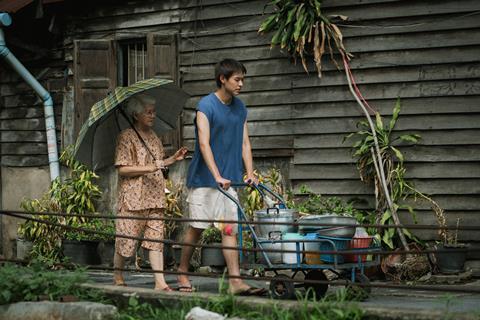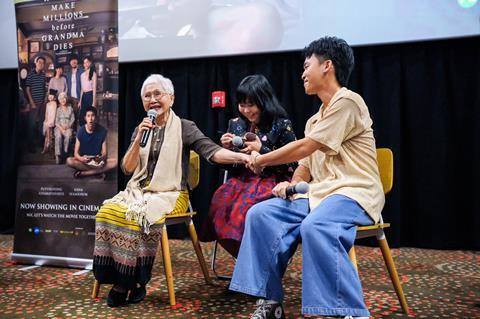
After scoring box office success in Southeast Asia, Thai blockbuster How To Make Millions Before Grandma Dies is set for its US premiere at the New York Asian Film Festival (NYAFF) on July 17.
Produced by Bangkok-based GDH 559, the family drama follows a young man, M, who moves in with his dying grandmother in the hope of winning her favour and ultimately her inheritance. It marks the debut directorial feature of Pat Boonnitipat and is the film acting debut of popular Thai singer Putthipong Assaratanakul (aka Billkin) and 78-year-old Usha Seamkhum.
The film has grossed $31m in Southeast Asia alone, including almost $10m (350m baht) in Thailand and $4m (S$5.5m) in Singapore, making it the highest grossing feature of 2024 in these two territories to date. It has also become the biggest Asian film of all time in Indonesia and the biggest ever Thai film in Malaysia, the Philippines and Myanmar. WME Independent handles international sales.
At NYAFF, tickets sold out almost immediately, leading to the festival scheduling a second screening, which will be attended by Boonnitipat and Billkin.
Vanridee Pongsittisak, head producer and script doctor at leading Thai studio GDH 559, spoke to Screen about how the project went from a simple idea to box office phenomenon.
What was the genesis of How To Make Millions Before Grandma Dies?
At GDH, the producers usually come up with the story before inviting a director to take part, or it can be the other way around. How To Make Millions Before Grandma Dies was the first project ever to be initiated by a writer – Thodsapon Thiptinnakorn, a full-time writer at GDH since 2009. In December 2020, he delivered a 10-page synopsis about how he had to care for his ‘Amah’ (grandmother) in the last days of her life during Covid. Before her death, Amah gave her inheritance to her sons but not her daughter, Thodsapon’s mother. Out of curiosity, he questioned why Amah didn’t give anything to the caregivers.
What were the challenges of expanding the synopsis into a feature-length script?
Jira [Maligool, also head producer] and I wanted to develop it straight away with Thodsapon. We worked on a few drafts together, trying to turn an extremely personal story into something that was more accessible and entertaining for a wider audience. This was also when we approached director Pat Boonnitipat to help shape the treatment. However, in the process, we realised the story had lost its original charm. We then stripped away a lot of the conventional plot elements — the twists, love interests — and were left with a simple structure: a grandson deepens his relationship with his Amah while caring for her and witnesses her relationships with her children toward the end of her life.

How did you greenlight the project?
When we presented the treatment, everyone at GDH was in tears. But while they loved it on a personal level, there were questions about box office performance since drama films or tear-jerkers have been struggling. When developing the screenplay, we really thought about the story’s cultural relatability as well as the choice of director who could unlock this potential. We had collaborated with Pat on Bad Genius The Series and The S Project, and saw his potential to work on a feature-length project that wasn’t just a Thai film but an ‘Asian’ film.
If it is meant to reach a wider audience, how did you map it out?
The first question I had after reading the synopsis was what makes a family. If we don’t spend time together, can we still call ourselves family? I was also interested in the relationship between love and money in Asian cultures. We may shy away from physical affection and express our love through materiality, but it is a complicated and confusing way of showing love. Are we upset at our parents because they didn’t give us money, or because we did not receive love? These are the questions I had in mind when thinking about the universal themes that Asian audiences can relate to, regardless of the country they are from.
You bet on a newcomer for the important role of the grandmother.
The casting of Amah was a long process. We specifically wanted someone never seen on screen before and wanted audiences to believe that she was really the grandma next door. Of course, we were aware that it was a big risk, not knowing if we could find our Amah on time or whether she was good enough to act. When the casting team suggested Amah Taew (Usha Saemkhum) and we watched her audition tape, we thought she had the charm. We asked Billkin to pair with her for a recast, since it was crucial they had chemistry. It turns out that they were completely natural and loving with each other.
At first, we were worried that Amah Taew was too soft in real life, since she has to play a tough street vendor and a grandma that is hard to please, so we had workshop sessions with her and director Pat, who has a talent for working with actors. When Pat felt confident about casting Amah Taew, I trusted him because I knew that he would be able to work with her.
Was it an easier decision to cast Billkin as the grandson?
Billkin was my first choice. During the audition, he was intelligent and witty, and his personality is so similar to the character of M that Pat thought it was almost uncanny. However, Pat felt Billkin’s acting fell short of his expectations, so he did not get the part right away. Billkin was so determined to get the role after a long break from acting that he put himself back into acting classes and came back to audition again. This time, his hard work paid off and he was able to convince Pat that he was ready to play M. Billkin was extremely comfortable on the set and was able to improvise freely while remaining true to his character.

How do you explain the phenomenal success of the film in Thailand and beyond?
Pat, Thodsapon and I wanted to plant a series of tip-of-the-iceberg elements throughout the film. Audiences may crash into one or some or all of them, depending on their own experiences. Rather than directing the audiences how they should feel, the goal is to preserve a ‘natural-ness’ that the audience can relate to their everyday lives.
The audience becomes more of a witness to a slice of someone’s family relationships, just like how M becomes witness to the members of his own family. You might not relate to any of the characters in the beginning, but after spending time with them and observing their relationships, you become completely invested and cannot help but think about your own family.
Apart from the box office, what has surprised you most about the response to the film?
I was struck by an audience member who described the film as a “good cry”. It’s the perfect way to describe it. This isn’t a sad movie, but it feels good to cry from it. I also love how this contributed to its word-of-mouth effect. People are eager to recommend it to their friends and families to come have a ‘good cry’, which has changed the viewing behaviour of audiences at movie theatres. We see people from all generations coming back into theatres because of this film.
It is very rare for a Thai drama, rather than a horror or action film, to find such international success. Will it be GDH’s biggest breakout hit ever?
There is a myth that it is difficult for drama or even ‘slice of life’ films to have box office success. With a 70-year-old woman as its main character and absolutely no romance, this film has completely debunked that. We did not expect this scale of success.
In 2017, Bad Genius’s worldwide revenue was $38m. How To Make Millions Before Grandma Dies has so far generated $31m in Southeast Asia alone. We are now waiting to see its performance after being released in China, South Korea, Australia and New Zealand [the latter two territories opening July 18].















![[Clockwise from top left]: Paul Thomas Anderson, Chloe Zhao, Ryan Coogler, Park Chan-wook](https://d1nslcd7m2225b.cloudfront.net/Pictures/274x183/9/0/0/1467900_writerdirectors_192733.jpg)






![[Clockwise from top left]: Paul Thomas Anderson, Chloe Zhao, Ryan Coogler, Park Chan-wook](https://d1nslcd7m2225b.cloudfront.net/Pictures/100x67/9/0/0/1467900_writerdirectors_192733.jpg)


No comments yet